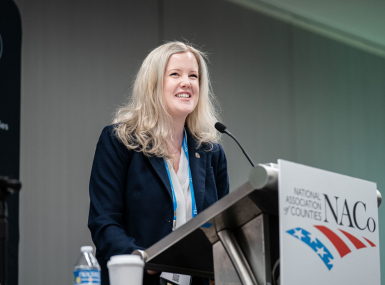News from Across the Nation - March 7, 2016

GEORGIA
Members of the CHATHAM COUNTY Youth Commission, visiting Washington, D.C. on Feb. 22, met for two hours with Supreme Court Justice Clarence Thomas, himself Chatham County native.
The commission was founded in 1992 by county Commissioner Priscilla Thomas, who continues her involvement. During their trip, the group also met with U.S. Rep. Buddy Carter (R-S.C.), toured the capitol, and visited the Smithsonian National Portrait Gallery and the Martin Luther King Jr. Memorial.
Photo courtesy of Chatham County, Ga. Youth Commission
ARIZONA
- Supervisors from LA PAZ, MOHAVE and YUMA counties met with federal officials in Washington, D.C., hoping to find a solution to the overpopulation of wild burros in the state’s western counties. The federal Bureau of Land Management estimates there are more than 4,400 wild burros in the state. Kurt Davis, chairman of Arizona’s Game and Fish attended the meeting. He said the burros are “ferocious eaters” that wreak havoc on the desert’s delicate ecosystem. Mohave County Supervisor Hildy Angius said one of her constituents incurred $96,000 in damages caused by burros last year, the Arizona Republic reported. County officials are looking for a long-term, humane solution. Among the options that were discussed include a burro “adoption” program and contraception.
- MARICOPA COUNTY Attorney Bill Montgomery is just saying “no” to iPhones for his staff. “Apple’s refusal to cooperate with a legitimate law enforcement investigation to unlock a phone used by terrorists puts Apple on the side of terrorists instead of on the side of public safety,” Montgomery said. The FBI wants access to data on an encrypted Apple smartphone that was used by suspects in the SAN BERNARDINO COUNTY shootings last December. His office will discontinue providing iPhones as replacements or upgrades for existing employees. There are currently 564 smartphones deployed throughout the office; 366 of them are iPhones.
CALIFORNIA
- Authorities say a new digital body scanner is improving security at both MERCED COUNTY jails. The $220,000 piece of equipment is meant to thwart those who would try to smuggle illegal items into the jails concealed in body cavities. The scanner can reveal objects such as drugs, explosives, weapons, needles, nails and scissors, the Merced Sun-Star reported. The image looks like an x-ray — contraband typically shows up in a darker color, jail officials said. Unlike airport scanners, which look for material above the skin, the jail scanners look inside the body, eliminating any privacy concerns about soft tissues, such as genitalia, being displayed. Capt. Greg Sullivan, commander of jail operations, said the scans are safe. “You can go through this machine up to 10 times a day, 365 days a year without violating the limit for radiation exposure.”
- Candidates for local elected office in SACRAMENTO COUNTY will be required to file campaign disclosure statements online. The move, approved unanimously by the Board of Supervisors, is expected to make it easier for the public to track spending in political races. The mandate goes into effect Aug. 1. It will apply to candidates for county offices, special districts and some school districts, according to The Sacramento Bee. Currently, the public has limited ability to remotely access campaign finance records, which typically has required a trip to a county office.
COLORADO
SAN JUAN COUNTY leaders — along with town of Silverton officials — voted to ask the state to seek Superfund status for the Gold King mine and several others that feed into the Animas River, the Denver Post reported.
Last August, the EPA accidentally released 3 million gallons of heavy-metals-laden sludge from the Gold King into a tributary of the Animas. Since then, the agency has spent $8 million on the spill, according to The Durango Herald.
Local officials have for years resisted EPA efforts to use the Superfund to deal with a cluster of toxic mines, including the Gold King. They’ve feared loss of local control and harm to the tourism economy.
“I was not in favor of Superfund. I still don’t like it,” said Commissioner Ernie Kuhlman. “But if we don’t do it, it will be done for us.
“If we don’t make this move, they will, and we won’t have a seat at the table.”
HAWAII
Counties would be prohibited from regulating geothermal power plants under a bill making its way through the state Legislature.
Under Senate Bill 2535, only the state could regulate “geothermal resources development and geothermal resources exploration,” unless it authorizes counties to do so, the Hawaii Tribune-Herald reported.
The measure comes in response to HAWAII COUNTY’s 2012 adoption of a ban on evening geothermal drilling after neighbors complained about noise from an electric utility’s nighttime activity.
ILLINOIS
Seven greater-Chicago-area counties and the city will work with the Brookings Institution over the next 10 months to attract more foreign investment to the region.
The Washington, D.C.-based think tank will work with COOK, DUPAGE, KANE, KENDALL, LAKE, MCHENRY and WILL counties to raise the metropolitan area’s profile abroad.
“There is no singular voice,” Mike Jasso, Cook County’s economic development director, told the Chicago Tribune.
Currently, 6 percent of the region’s workforce is employed by foreign-owned firms.
MICHIGAN
If the mosquitoes that carry Zika virus are found in OAKLAND COUNTY, there’s a plan in place to deal them.
The county’s strategy includes a health division staff meeting with the county’s municipalities this month to give an update mosquito-borne disease prevention and control; ongoing distribution of educational posters to all obstetricians and gynecologists; and providing educational information to the public through social media.
NEW JERSEY
The Cedar Bridge Tavern might not have the same name recognition as Lexington and Concord, but the site of one of the last skirmishes of the Revolutionary War is getting a boost to make sure it doesn’t fade into memory.
OCEAN COUNTY plans to spend $2.2 million to develop a historic site in Barnegat where New Jersey militiamen were ambushed by a British loyalist in 1782.
A caretaker’s cottage and outdoor classroom facility would be built with the funds, in addition to the purchase of furniture, fixtures and equipment for the site, according to the Asbury Park Press. The tavern where the militiamen had stopped is now part of the county’s parks system. Every December, Revolutionary War re-enactors gather to recreate the skirmish.
NEW YORK
- WARREN and WASHINGTON counties, already sharing a border and one of the biggest tourist attractions in the region, have begun to share tourism promotion resources. Washington County’s tourism office is currently understaffed. Warren County’s Tourism Department will include information about Washington County attractions in some of its electronic marketing. Washington County in turn will market the lodging availabilities in Warren County. The mindset has changed from years ago, when the counties viewed each other as competitors, The Post-Star reported.
- In response to the opioid abuse epidemic, SUFFOLK COUNTY has launched a 24-hour hotline for screenings, referrals and follow up for anyone seeking assistance. The nonprofit Long Island Council on Alcoholism and Drug Dependence will staff the service, which is scheduled to launch in April, the Long Island Exchange reported. The Suffolk County Health Department will provide oversight and analyze data to monitor its effectiveness and identify trends and emerging issues in the community.
OHIO
A performance audit by the Ohio Auditor of State found that Great Parks of HAMILTON COUNTY provides a lower tax burden than other county park district in the state.
The parks district itself asked for the audit, according to the Cincinnati Enquirer, ahead of the expiration of its current levy and before putting another levy on the ballot.
OREGON
Homeless and affordable housing service delivery may change dramatically in Portland and MULTNOMAH COUNTY, with the county handling homeless services and the city managing affordable housing.
The Oregonian described the current division of urban services as “ambiguous.” A study group has recommended the creation of a Joint City-County Office of Homeless Services, which would report directly to Multnomah County Chairwoman Deborah Kafoury, and employees would be “hosted” at the county.
Both the city and county have declared “housing states of emergency.”
TEXAS
Sandy streets may be on the way out in parts of BEXAR COUNTY. The Commissioners Court will consider repairing roads in a private subdivision that can’t reliably carry ambulances, mail trucks, garbage trucks and police cars.
The roads are private and currently ineligible for local public funds and many federal grants, so the county may assume control, the San Antonio Current reported. Paving the roads in the subdivision would cost roughly $5.5 million, with another $11 million going to sidewalks and curbs.
VIRGINIA
AUGUSTA COUNTY may go back to paper ballots in the November General Election, now that the county’s touchscreen voting machines are reaching the end of their 10-year lives. The dearth of replacement parts and concerns about malfunctions have motivated the change.
The proposed optical and digital scanning equipment that would replace the current voting machines is expected to cost $350,000, but according to the News Leader, the county’s Board of Supervisors may wait until after the presidential election to change systems.
WISCONSIN
- County executives may be barred from simultaneously serving in the state Assembly. A bill to that effect passed the Senate on a 53–40 vote. The bill was in response to the candidacy of WINNEBAGO COUNTY Executive Mark Harris, a Democrat who is running to fill a vacant Senate seat, The Capital Times reported. The bill does not preclude a county executive from running for a seat in the Legislature; it only says he or she cannot hold both posts at once.
- MILWAUKEE COUNTY says its no-strings-attached, free housing program for the homeless, launched in September, is saving the county money. “Housing First,” based on a national model that’s been successful in a handful of other cities, took in 100 people within three-and-a-half months. Once settled into housing, the formerly homeless are introduced to addiction services, if needed, but sobriety is not mandatory. The county is basing its savings estimate on the $35 per day cost compared to $100 per day to keep them in jail or prison, plus $950 for police responses and more than $1,000 for trips to the emergency room, according to TMJ4 News. The county plans to double its capacity in the program over the next year.
News From the Nation’s Counties is compiled by Charles Taylor and Charlie Ban, senior staff writers. If you have an item for News From, please email ctaylor@naco.org or cban@naco.org.
Attachments
Related News

NACo Hosts County Leaders in Washington, D.C. and Launches We Are Counties National Public Affairs Advocacy Campaign
NACo is hosting nearly 2,000 county leaders from across the country for our annual Legislative Conference February 21-24.

Proposed bill ties Social Security funding to public lands activity
An Arizona congressman hopes to link Social Security funding and public lands policy.

